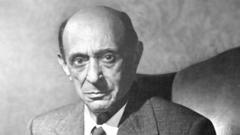In a devastating turn of events, over 100,000 musical scores belonging to the illustrious composer Arnold Schoenberg were lost in the wildfires that have swept through Los Angeles. The fire obliterated Belmont Music Publishing, the family-run production company that housed these vital scores in the Pacific Palisades area. Fortunately, original manuscripts remain intact, as they reside in Vienna’s museum, yet the impact on musicians who relied on the extensive collection for performances is deeply felt.
Leon Botstein, director of the American Symphony Orchestra, highlighted the significance of the lost scores, calling them an "indispensable resource" for musicians, which underscores the larger implications of the loss. Larry Schoenberg, Arnold’s son, expressed the profound cultural impact this destruction has caused, describing it as more than just physical damage, but a significant blow to the preservation of musical heritage.
The works of Schoenberg, born into a Jewish family in Vienna in 1874, significantly transformed the musical landscape, steering away from traditional harmonies and pioneering atonality and the 12-tone technique. His infamous flight from Berlin to Los Angeles in 1933 to escape Nazi persecution ultimately led to his continued innovation in music until his passing in 1951.
Amidst the ongoing wildfire crisis that has claimed at least 24 lives, with thousands of structures reduced to ashes, Belmont Music Publishing voiced hope for recovery by aiming to digitize the scores. Their statement reflects a desire to "rise from the ashes" and renew operations in a modern format.
As California continues to grapple with the devastating effects of these wildfires, including two major ongoing blazes, the legacy of Schoenberg and the disruptions to the artistic community remain a poignant reminder of the broader impact of natural disasters on cultural icons and institutions worldwide.
Leon Botstein, director of the American Symphony Orchestra, highlighted the significance of the lost scores, calling them an "indispensable resource" for musicians, which underscores the larger implications of the loss. Larry Schoenberg, Arnold’s son, expressed the profound cultural impact this destruction has caused, describing it as more than just physical damage, but a significant blow to the preservation of musical heritage.
The works of Schoenberg, born into a Jewish family in Vienna in 1874, significantly transformed the musical landscape, steering away from traditional harmonies and pioneering atonality and the 12-tone technique. His infamous flight from Berlin to Los Angeles in 1933 to escape Nazi persecution ultimately led to his continued innovation in music until his passing in 1951.
Amidst the ongoing wildfire crisis that has claimed at least 24 lives, with thousands of structures reduced to ashes, Belmont Music Publishing voiced hope for recovery by aiming to digitize the scores. Their statement reflects a desire to "rise from the ashes" and renew operations in a modern format.
As California continues to grapple with the devastating effects of these wildfires, including two major ongoing blazes, the legacy of Schoenberg and the disruptions to the artistic community remain a poignant reminder of the broader impact of natural disasters on cultural icons and institutions worldwide.





















